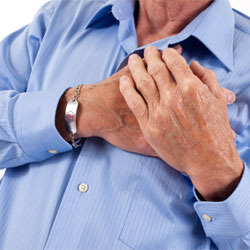In a cardiac arrest, the first sixty minutes is crucial for diagnosis and treatment, says Dr SK Agarwal, senior interventional cardiologist, Kailash Hospital and Heart Institute, Noida.
You can save a life if you act on time.
 Cardiovascular disease is the number one cause of death globally and an estimated 17.5 million people died in India from CVDs in 2012, according to a report by World Health Organisation.
Cardiovascular disease is the number one cause of death globally and an estimated 17.5 million people died in India from CVDs in 2012, according to a report by World Health Organisation.
Of these, more people die before they reach the hospital, says Dr SK Agarwal.
In most of these cases it has been observed, that ignorance, combined with a lack of presence of mind, has delayed timely treatment.
In simple terms, a person suffers from cardiac arrest when the supply of oxygen-rich blood to the heart is interrupted -- by a clot, stress or blockage of the arteries.
Dr Agarwal tells us why it is important to identify a cardiac arrest and what can be done in the first 60 minutes -- before a patient reaches a good hospital.
How to identify a heart attack
Most people mistake a heart attack with gastric pain and delay treatment.
Thumb rule: Never ignore any pain in the chest area.
Heart attack is generally characterised by severe pain in the chest area that radiates to the arms, jaws and throat.
The patient may also experience vomiting, sweating and giddiness.
If all the above signs are positive, do not delay action.
Remember, time is crucial in the prognosis of a heart attack.
The first three to six hours are crucial for treatment.
And the first hour is the golden hour.
What to do in the golden hour
1. Recognise the pain and do not delay action.
2. Make the person sit or lie down in a comfortable position.
3. Simultaneously, make arrangements to reach a nearby hospital as soon as possible.
4. You may contact an ambulance and wait, but if there is an opportunity to take the patient to the hospital directly -- by car or auto (rickshaw), do it.
5. Do not waste time in calling a general practitioner as in the case of a cardiac arrest he will anyway advice you to take the patient to a good hospital.
6. Do not take the patient to a clinic or dispensary.
Ensure that the hospital you're taking the patient to has an ECG machine.
Remember, the intensity of the pain cannot be diagnosed without the help of an ECG machine.
7. If you are alone at home and waiting for medical help, give a 325 mg Aspirin to the patient.
Most homes, I believe, will have this medicine. This will give relief from pain.
8. You may check the pulse of the patient and if the patient's blood pressure is normal, you may give Sorbitrate 5 mg capsule and ask him/her to keep it under the tongue.
9. This will dilate the blood vessels and help blood flow faster than usual. If the blood pressure is abnormal, avoid this step.
10. If the patient is unable to breathe on his own, you may give him CPR or mouth to mouth breathing.
11. Alternately, you can use your fist to thump the chest of the patient, right in the middle.
This technique helps relieve any sudden compression in the chest area.
12. Irrespective of what first aid you give, try to reach the hospital within the first hour of diagnosing the chest pain.
Lead image used for representational purposes only. Credit: Rediff Archives









